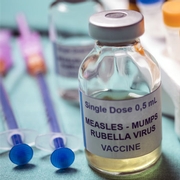Information you need to live a happy, worry-free retirement!
Originally published May 30, 2019, last updated June 3, 2019
Do You Need a Measles Shot Amid Recent Outbreak?

The recent measles outbreak has many older Americans wondering if they need a booster or questioning if they ever were vaccinated.
While most are likely vaccinated or already immune, there are a few exceptions. Here, we review the vaccine basics and cover who might need to take action.
Reviewing the Basics
The Centers for Disease Control and Prevention (CDC) recommends that people get measles, mumps and rubella (MMR) vaccine to protect against the diseases. Children should get two doses of MMR vaccine, starting with the first does at 12 to 15 months of age, and the second does at 4 through 6 years of age.
If you got the standard two doses of the MMR vaccine after 1967, you should be protected against the measles for life. The measles vaccine was introduced in 1963, but a version of the measles vaccine in the mid-to-late 1960s was not as effective as the current regimen. So if you were vaccinated before 1968, you should talk to your doctor about whether you need newer vaccines.
Doctors assume that if you were born before 1957, you were exposed to measles and are immune.
If You Can’t Find Vaccination Records
But what if you don’t have your vaccination records to rely on? You can either get a simple blood test that detects immunity or just get vaccinated. The CDC website says “there is no harm in getting another dose of MMR vaccine if you may already be immune to measles (or mumps or rubella).”
The CDC recommends that adults who do not have evidence of immunity get at least one dose of MMR vaccine. But it also says some people should not get MMR vaccine, including those with a weakened immune system due to disease or medical treatments, those with severe, life-threatening allergies and those with a condition that makes them bruise or bleed easily. If you think you may need to get the vaccine, talk to your doctor about what other conditions may also need to be considered before getting vaccinated.
Medicare and the Measles Vaccine
If you have a Medicare Part D Prescription Drug plan or a Medicare Advantage Plan Part C that offers Medicare prescription drug coverage, it may cover the MMR vaccine, according to the CDC.



